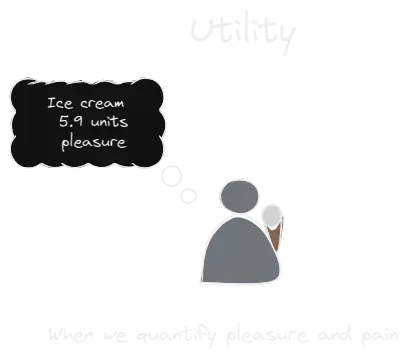Utility
Notes
The concept of utility was born together with the view of Utilitarianism, which means that the amount of pleasure and pain that we are feeling can be quantified and measured. When an action has no utility or a utility of 0, either the pain and pleasure cancel each other out or that it contributes none to it, then we can say we are indifferent to it.
The attempt to quantify utility from decisions in a comparable way across people ignores the the hard problem of consciousness. When we ask people "how happy are you from 1-10", can we truly know that your 10 "feels that same" as my 10? Does it translate to a similar mental state?
Thinking through the lens of utility can turn us into Econs, we become a human calculator, trying to predict the potential outcome in numeric terms. Instead of "I wish to do this" or "this feels right", we only act if the outcome is larger than 0. It also turn us into one-dimensional being as if the only thing that's worth quantifying is our pain-pleasure meter, as if our entire human experience can be reduced to a single metric. In a way, it's a case of streetlight effect, where we might end up focusing on an easy metric, ignoring other metrics of morality and wellbeing that might be just as important.
There's a hedonistic flair to utility, although it's not necessarily so. We can allegedly quantify the pleasure someone gets from "doing what's right", from following moral duties rather than basic pleasures, but nevertheless, it would always be analyzed through the prism of pleasure and pain, and in that sense it's hedonistic. Similarly. every action only has an Instrumental value, depending on the joy it beings to the one who acts.
Visual

Overview
🔼Topic:: Human Nature (Map) ↩️Origin:: 🔗Link::